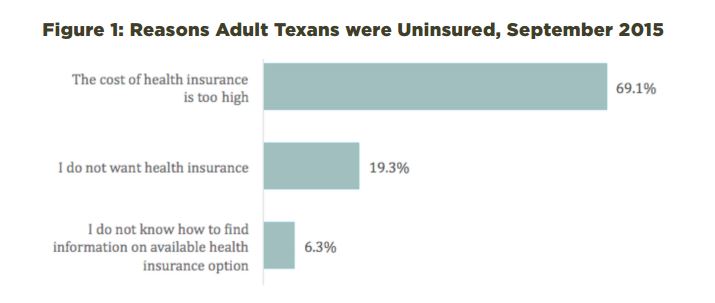70% of Uninsured Texans Find Medical Coverage Costs too High
The youngest and oldest generations polled were more likely to cite the costs as a reason for lacking medical coverage than the middle-aged groups.

- The Rice University's Baker Institute for Public Policy and the Episcopal Health Foundation (EHF) found in a new report that nearly seven out of ten uninsured Texans cite the high costs of medical coverage as the reason for lacking insurance. Additionally, less than 20 percent of surveyed uninsured residents from the state of Texas stated that “they simply don't want health insurance,” according to a joint press release from the two organizations.

Prior research from the Baker Institute and the Episcopal Health Foundation discovered that nearly one out of five Texans still lack medical coverage. Regardless of age, ethnicity, and income level, cost was uncovered as the main reason for lacking health insurance among the uninsured Texans surveyed in the study.
Only 6.3 percent of those polled felt that “lack of information” about medical coverage options stopped them from obtaining a health insurance plan. This shows that there is not as much of an obstacle in the case of Texans missing key information on health insurance plans through the exchanges.
There have been several programs that have supported informing the public about the Affordable Care Act and the health insurance marketplace, said Elena Marks, EHF's president and CEO and a nonresident health-policy fellow at the Baker Institute.
“An important finding of this survey is there's no significant information barrier for Texans who still don't have health insurance,” Elena Marks said in a public statement. “Just two years ago, it was a much different story. As the Affordable Care Act (ACA) coverage options went into effect, lack of information about the law and the new health insurance options was widespread.”
“More than 1 million eligible Texans enrolled in health insurance through those plans,” Marks continued. “The significant drop in the state's uninsured rate is not surprising in light of those efforts. But as this latest report shows, Texas still has a long road ahead to be able to benefit from ACA coverage opportunities. Medicaid expansion alone would allow more than 1 million additional Texans to have health insurance.”
One interesting finding from the Health Reform Monitoring Survey is that the youngest and oldest generations polled (from ages 18-30 to ages 50-64) were more likely to cite the costs as a reason for lacking medical coverage than the middle-aged groups. The results show that 75 percent of the youngest and oldest generations cite cost while 64 percent of the middle generation considers cost as prohibitive when it comes to obtaining medical coverage plans.
The youngest group may have trouble purchasing health coverage because of age band rating rules related to the costs of premiums implemented under the Affordable Care Act as well as the fact that younger generations with less experience tend to earn less in today’s economy than older, more established employees.
“Premiums are on average higher for older groups than their younger counterparts, which would make affordability a more significant issue,” Vivian Ho, the chair in health economics at the Baker Institute and director of the institute's Center for Health and Biosciences, a professor of economics at Rice and a professor of medicine at Baylor College of Medicine, stated in the press release. “Overall, young people earn less than older people, so even well-priced insurance plans seem less affordable.”
Another reason why high cost remains a barrier to purchasing health coverage among the uninsured is that, as an individual’s income increases, the federal subsidies through the insurance exchanges are “less generous,” which could be a monetary problem for people making a lower middle annual income and living on a “limited budget,” the report states.
Among polled, uninsured Texans aged 31 to 49 years old, 27 percent stated that they did not have coverage because they did not want to purchase health insurance plans. The other groups based on age did not have nearly as high of a percentage with regard to this specific reason.
The Health Reform Monitoring Survey began three years ago and has been administered quarterly to measure how the Affordable Care Act and other measures are affecting health insurance among the population in Texas. In particular, the reports are meant to track any changes in health coverage and patient outcomes as the healthcare industry continues to reform its practices.
While cost seems to be the overarching theme of why many uninsured Texans remain without medical coverage, it might be worthwhile to continue stressing the opportunities available through the health insurance exchange. Low-income families and individuals may qualify for federal subsidies through the exchange and not be required to cover the costs of monthly premiums.
However, the state of Texas could also benefit from expanding the Medicaid program with the majority of funds covered by the federal government due to the stipulations of the Affordable Care Act.
“In Texas, funding from federal and some local governments, and philanthropy have supported broad and successful efforts to educate the public about the ACA and to enroll more than one million eligible Texans in Marketplace plans,” the report stated.
“The significant reduction in Texas’ rate of uninsured adults is not surprising in light of these efforts. Texas still has a long road ahead to be able to benefit from ACA coverage opportunities, including Medicaid expansion, which alone would bring more than one million additional Texans health insurance coverage.”
Currently, a healthcare coverage gap exists in Texas and other states that have foregone Medicaid expansion. Certain populations have incomes that are too low to qualify for federal subsidies on the exchanges but too high for current standards under state Medicaid programs.
“For those who are below 100 percent of the poverty level, they can’t get a subsidy in the marketplace so they are faced with nothing or paying 100 percent of the premium,” Marks told HealthPayerIntelligence.com.
“The people who have higher incomes are eligible for subsidies, but those with lower incomes are not. The Affordable Care Act was designed so that the lowest-income families would be covered by Medicaid. When the Supreme Court made [Medicaid expansion] optional, it meant that it was up to each state to make that decision.”
“Texas is one of an increasing minority of states that has not expanded Medicaid. For a significant number of Texans estimated to be a minimum of one million, there is nothing that will change for them outside of a Medicaid expansion.”
With the help of Medicaid expansion, many Texans would no longer need to cite cost as a prohibiting factor from obtaining health insurance.

